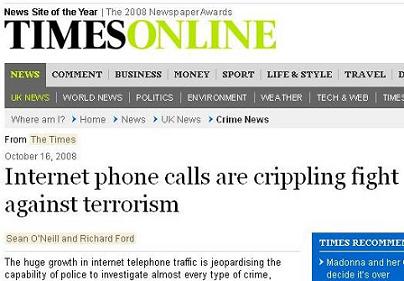Original URL: https://www.theregister.com/2008/10/16/interception_modernisation_analysis/
Das überdatabase: Inside Wacky Jacqui's motherbrain
A two-pronged assault on civil liberties or a necessary upgrade?
Posted in Legal, 16th October 2008 14:24 GMT
Analysis Home Secretary Jacqui Smith isn't known in these pages for the clarity of her pronouncements on technology. And yesterday, as she confirmed the government's plan to proceed with the Interception Modernisation Programme (IMP), she limited herself to the spin of building a universal communications surveillance apparatus.
The details of the accompanying Communications Data Bill will be opened to consultation in the new year, she said, with the aim of achieving consensus with "interested parties". Smith was keen to emphasise the content of every phone, internet and mobile communication will not be harvested, but the details of who contacts whom, when and where. That distinction is likely be the cornerstone of attempts to sell IMP to MPs and a public wearied by the erosion of civil liberties and major government data losses.

Says who?
Smith was clear that she won't take "no" for an answer. "All this is a reflection of the technological and behavioural changes that the growth of the internet brings. Once again, that is not a Government policy which is somehow optional. It is a reality to which Government needs to respond," she said.
The follow-up propaganda push has already begun today. In The Times an unnamed source, clearly with a strong desire to see IMP built, spoonfed a dubious and old story about the threat posed by Skype and other VoIP applications to counter-terror operations. The hungry Thunderer hacks swallowed the security services' line that "internet phone calls are crippling fight against terrorism". No quotation marks in that headline, no opposing view in the story: it's being crippled people - fact.
Then with impeccable deadpan delivery, we're told in the penultimate paragraph that "The Times has learnt that police chiefs are to begin a discreet lobbying exercise in favour of the new powers". No, really?
Such media glove-puppetry will intensify in the coming months. People with knowledge of IMP developments in Whitehall and industry told The Register over summer that Jacqui and the security services do not speak for the whole of the government on the project. One memorably said the intelligence services' suggestion that IMP would seek to standardise all UK communications data and record details of every chat session had been described as "science fiction" by ISPs. The Cabinet Office and Treasury are also known to have major reservations.
But why?
The reasons why GCHQ and others have been able to persuade ministers that spending £12bn - the budget figure being floated in government - is a good idea despite fierce opposition IMP has and will face demand better illumination. The project is best explained as two simultaneously parallel and intertwining strands which will allow snoopers to very quickly see who their targets communicate with, and - with a warrant - what they are saying:
- The überdatabase
A massive central silo for collecting, processing and cross reference details of emails sent, websites visited, calls made, mobile phone cell locations and more. Probably administered at "the doughnut", GCHQ's iconic Cheltenham spy station. This data won't be intercepted, but ISPs and telcos will provide it in real time from their own back end systems.
- The "black boxes"
This network of wiretaps will put the "interception" into "Interception Modernisation Programme", using the information in the central comunications data silo to target suspects' traffic. It'll be hugely expensive to ensure the complete coverage spy chiefs want, but the plan is that any internet protocol (IP) communication will be available for interception. It means calls, texts, gaming, chat and web browsing will all be laid bare to analysts.
Arrangements have long been in place with major telecoms and internet providers to access a lot of this type of data on a case-by-case basis. It's proved valuable as an investigative tool and as evidence in countless crimes; 95 per cent of serious crimes since 2004, the Home Secretary said yesterday. It's known that major communications firms have people on staff who are effectively employed by the intelligence services, ready to grab any data required.
But pooling all such data centrally means even on its own, the überdatabase is powerful and unprecedented. The scenarios are not hard to imagine: a UK jihadi is discovered buying fertiliser by MI5 as part of its normal monitoring of retailers. A quick call to the lads at GCHQ turns up his web browsing history and it turns out he's spent a lot of time on 72virgins.com. IMP is deployed and at the same time a list of everyone else in the UK who has visited that site is produced. Those names are then cross referenced with mobile phone records, and the location data reveals a pattern showing six visitors to 72virgins.com have often been in the same location in London. Instantly, we've got our terror cell.
Replace jihadis with paedophiles, animal rights extremists or whoever, and the power of the überdatabase to expose networks is obvious. As, to many Reg readers, are the dangers of trusting government agencies with such an ocean of data. The intelligence services have a long and unfortunate history of lost laptops - the spooks were forgetful in the bars of Westminster and Vauxhall before it became trendy throughout government.

A typical day at GCHQ
The Eye-O-SauronJacqui™
For IMP critics, the biggest worry is that the überdatabase won't only be used in the kind of reactive way described above. With all that lovely data on hand at all times, the temptation for analysts to go on "fishing trips", attempting to proactively look for "terrorist" patterns will be strong, they charge. It's a concern shared by Liberal Democrat Lord Carlile, the government's independent scrutineer of counter-terror legislation.
According to an influential US government-backed report released last week, at present the software techniques for counter-terrror data mining are mostly ineffective. There is a world of secretive companies working on the problem, however, such as BT spin-off ThorpeGlen and black box provider Detica.
At the beginning of this month vendors met at a conference called ISSWorld Europe in Prague to discuss such topics as "Investigative Analysis and Intelligence Gathering Solutions". El Reg (very) speculatively asked to attend, and was politely told to foxtrot oscar.
Jacqui Smith seemed to indicate yesterday that the ways authorities are allowed to use the überdatabase might be limited when she said: "We also need to agree what safeguards will be needed, in addition to the many we have in place already, to provide a solid legal framework which protects civil liberties."
As we've seen many times in recent years, such safeguards and "solid legal frameworks" are likely to be flexible in times of perceived crisis.
And as we've explained above, the überdatabase is only one piece of the two-part IMP puzzle. When linked to the black boxes it will facilitate on-demand wiretapping of any communication in the UK. Once the überdatabase is in place authorities will know which nodes in the networks - be they chat clients, email programs, mobile phones, websites - are talking to each other. Together with a black box tap on every wire, all it need do is flick a switch and all of a suspect's conversations across every communications device and application will be mirrored to analysts. We're presuming Jacqui's "restrictions" don't extend to tightening the terms of RIPA warrants.
The irony of the naked propaganda published by The Times today is that it cites Skype as the problem IMP is intended to solve. Although the überdatabase will collect new intelligence on who is using the world's most popular VoIP system, Skype's encryption algorithms mean the content of computer to computer UK and international calls will remain as obscure as ever.
Nevertheless, if IMP's instant access £12bn digital surveillance buffet is indeed built, then the UK government's ability to eavesdrop on citizens will have no compare worldwide. And no amount of consultation or consensus will change that. ®